Glyph 2015 will be unveiled at the Glyph Gala, 7 p.m., Tuesday, May 5 in O’Shaughnessy Performance Center, with readings, music and refreshments.
“Portrait of a City”
posted by admin
“Portrait of a City” by Alexandra Spensley received first place in the 2015 Glazner Prize for Creative Writing contest, sponsored by SFUAD’s Creative Writing and Literature Department. Part I: Streets & Avenues The city receded like tidewater, brackish. I watched it slide. Metal accepted metal in a blur of ticking steel, urban heartbeats. Sidewalks swallowed themselves: unclean tongues roving through a city scorched sideways. Who will shoulder this weight? I am left with empty husks, the shadows of buildings ashen as roman carpets. Alone, I map my way through the rubbish: slabs of stone, loose teeth, a child’s violin splayed open and bleeding, red-eyed mice twisting in its hollow chest. I hung the city like wallpaper, then tore it in two— and it was not stitched from a paste of broken stars, not submerged in the hot sways of red dresses— no, the city was a cut-glass mobile, enthralling, suspended above a child’s eager hands. Part II: Harvests We knew we were done for when the newspaper said one-fourth of the houses in the eastern district now stood vacant, empty monuments to the past. That same newspaper had voted us best hardware store in the city for three nonconsecutive years—we had their dates on a plaque in the frosted-glass window out front—but who needs a hardware store when there’s no houses left? I started rearranging things. I moved the Phillips screwdrivers to aisle four and put most of the auto parts by the cash register. Nothing worked except positioning the blue paint-thinner jars in front of the window; this spiked sales for a few weeks before my conscience made me move everything back. Soon nearly everyone who came in was trying to tune up their cars for the long drive to a new house, buying gallon jars of oil and gas or trailer hitches for U-Hauls. When I asked them where they were moving to, they all mumbled something along the lines of “Oh, Barb and I are headed west” or “We’re taking the kids up north for high school”—indiscriminate, vague substitutes for “anywhere but here”. Outside, foreclosure signs sprouted like poppies in a pasture. Outside, the rain started. I thought we could struggle by on what we’d saved up from the good years, but when the generator busted ($5,000) and the roof started leaking ($6,000), I had no choice but to close the place down. I used all of our meager revenue from the past four months printing out huge black-and-red EVERYTHING MUST GO signs, hung them out front next to the posters of angry-eyed kids with ‘missing, desperacido‘typed in block letters on top. There were dozens of those missing posters—I pasted each one I found; I just couldn’t stand those kids’ eyes. My wife suggested that we move out after closing shop, let our house become another shuttered tomb in the sea of a dying city. I told her no, I couldn’t release this land after so many years of holding it— so long that it had bloomed roots around my tired wrists. Still, the sight of the grocery on Sunday pierced me: washed-out high school kids, coughing up cigarettes in the parking lot; shelves heavy with a lack of bread; the thick, tangible seep of money right into the greedy earth. Gone. In the end, we couldn’t sell everything in the shop and drove it to the town dump instead; we needed three full pickup beds to move it all. Paradoxically, the dump seemed to be the liveliest place in the city: laughing, tanned men in cutoff shirts, cheerily tossing mountains of metal screws and power drills into the gaping tongue of a trash compressor. The leather of the pickup’s passenger seat stuck tight to my thighs; soon, summer would be here. In the rearview mirror, I watched the men heave trash bags over their shoulders like insect cocoons full to bursting, like a reaping of...
The Poet’s Guide to Journalism
posted by Jonathan Hargraves
On Oct. 14, Tom Sleigh, a noted poet, read excerpts from his most recent collection of poems — “Station Zed” — to a crowded O’Shaughnessy Performance Space at Santa Fe University of Art and Design. The collection is part of a new body of work by Sleigh inspired by his recent travels to the Middle East. In addition to the poems, Sleigh journalized the experience in an essay titled “The Deeds” in which Sleigh casts himself as a poet in journalist’s clothing, seeking passage to the Lebanese city of Qana in order to learn the Palestinian side of the 2006 Israeli-Palestinian conflict. “I loved doing it,” Sleigh says, “I didn’t think about myself…all doubts immediately vanished… [and] there was no detail too small that wasn’t suddenly charged with interest.” “The Deeds” was published in the Virginia Quarterly Review in 2008, and selected for inclusion in the 2009 edition of the “Best American Travel Writing” compendium. However, before this acclaim Sleigh says he had no desire to go to Lebanon — adding, as a joke, that he barely knew where to find it on a globe. “What I didn’t know about Lebanon could fill many books.” In 2007, Munir Akash invited Sleigh to Lebanon. Akash is the founder of the Trans-Arab Unity Foundation, and Sleigh’s invite was part of an initiative by the group to bring artists and writers to the Middle East. Sleigh says Akash wanted him to assess and write about the conditions of Palestinian refugees, “particularly in the aftermath of the 2006 war.” Originally, the trip was postponed for three months, Sleigh says, because of backlash from the murder of “a very prominent Christian Maronite politician” — Plerre Gemayel. According to the trans-Arab news network Al-Jazeera, the cabinet minister was gunned down in his car during a traffic jam in a Christian neighborhood — almost immediately his death was followed with “angry protests” by his supporters. Though unsettling for Sleigh, an assassination turned out to be the least of his worries. “As soon as we landed,” he says, “a huge car bomb went off.” In Lebanon, Sleigh says car bombs are so frequent that while watching Abbott and Costello’s “Meet the Mummy” in a Beirut hotel room, he saw commercials for personal bomb-detecting devices — an experience upon which he elaborates in “The Deeds.” During his visit, the violence only escalated. Sleigh says he experienced some of the worst internal violence since the 15 years of civil war that took place in Lebanon between 1975 and 1990. “People were being blown up all the time…and I was scared.” In spite of his fear, or maybe as a result of it, Sleigh became “acutely aware” of the world around him, and was “totally interested in what everybody was wearing, what they were thinking [and] what they were saying.” The experience, at times, was even “exhilarating.” Because most of the fighting in 2006 had occurred in the southern part of Lebanon, Sleigh says he decided to go there to see what, if anything, had been preserved. “But did I know what the hell I was doing?” Sleigh asks, adding, “no.” Never before had Sleigh attempted journalism. Sleigh met Chris Merrill — another poet whom he describes as an “old-school journalist who covered the Bosnian war.” Merrill showed Sleigh the journalistic ropes, and through technical mimesis Sleigh acquired the information-gathering skills that would be required of him to complete “The Deeds.” “It was monkey see, monkey do,” he says, but “poetry taught me how to compress information, and to describe accurately what I see.” In gathering information for his essay, Sleigh says he “did lots of interviews,” and not once throughout the process did he use a tape recorder, which he believes acts as a barrier between the journalist and the subject when the two are attempting to establish trust. Also, a subject — in the absence of a tape...
Tales From The Trenches: Michael Wiegers
posted by Sara Malinowski
Copper Canyon Press Executive Editor Michael Wiegers visits SFUAD’s Creative Writing Department and discusses the press and contemporary publishing.
Real Moves Echo Real Food
posted by Sara Malinowski
Art, poetry and dance were all featured at the Southwest Regional Real Food Summit, held on campus March 1.

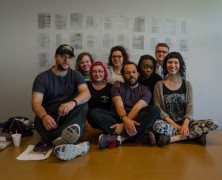
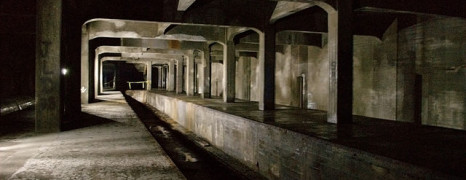
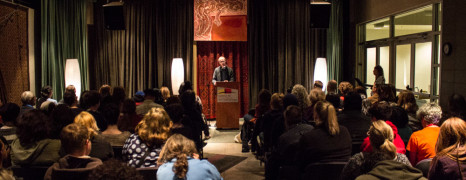
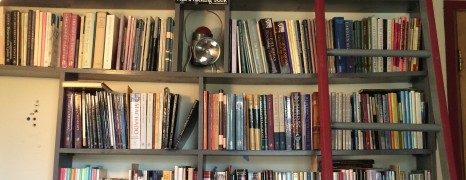
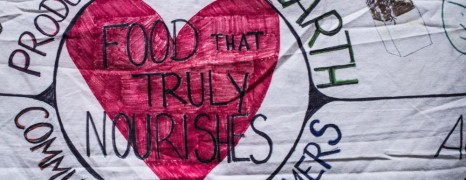
 Jackalope Magazine is the student magazine of Santa Fe University of Art and Design. Building on the interdisciplinary nature of our education, we aim to showcase the talent of our university and character of our city.
Jackalope Magazine is the student magazine of Santa Fe University of Art and Design. Building on the interdisciplinary nature of our education, we aim to showcase the talent of our university and character of our city.
Recent Comments